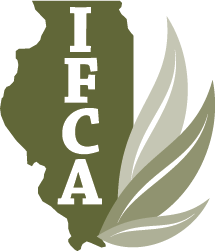Steps to Keep Dicamba in the Integrated Weed Management Toolbox
We feature this subject as a REGULATORY ALERT not because it is a new regulation, but on the premise that if dicamba on soybean is not carefully managed in 2018 to reduce off target movement, there is a high probability that USEPA will cancel these labels. Furthermore, there is a strong possibility that in subsequent years, the potential misuse of other dicamba products on soybean could threaten the use of dicamba in all crops. Aside from USEPA actions, the Illinois legislature could also act to restrict this and other pesticide uses if off target movement and symptoms of off target movement on soybean and other non-target plants is not drastically improved over last year. Concerned groups will be watching us, this we can assure you.
On March 8, 2018 the IFCA Board of Directors met with Dr. Aaron Hager, our Land Grant University Weed Scientist, and asked for his recommendations for successful weed management in 2018, including the use of dicamba in a weed management strategy for soybean.
Dr. Hager issued a Bulletin today outlining steps to take to ensure the careful management of dicamba in 2018. Click here to access the Bulletin. It outlines a four-step process to manage weeds in soybean. To summarize:
1. Start with a clean field; plant into a weed free seedbed using tillage and/or a combination of burndown herbicides.
2. Select and apply within 7 days of planting a soil-residual herbicide that targets your most problematic weed species.
3. Scout fields 14 days after planting. Apply dicamba at 0.5 lb ae/acre when weeds are less than 3 inches tall and when conditions allow for application.
4. Scout treated fields 7 days after the dicamba application. If control is not complete or another flush of weeds has emerged, consider using non-dicamba options for complete weed control: alternative herbicides, cultivation, and hand rogueing. The goal should be zero weed seed production.
Last July, IFCA surveyed our retail members asking for your input on successful dicamba management based on lessons learned in 2017. In your responses, the majority of retailers noted that the earlier the application, the least number of problems with off-target movement. The Bulletin emphasizes this point and the steps above promote the necessary implementation of integrated weed management, scouting and early application.
Please review the detailed recommendations in the Bulletin and share this with your customers. With no new herbicide active ingredients coming any time soon, we cannot afford to lose a tool in our fight against competitive weeds. 2018 is a monumentally pivotal year in terms of pesticide stewardship. Thank you for your help in this effort.
Update on Dicamba Training: There are only two classroom training events remaining on the calendar: one in Carbondale on March 23 and one in Rockford on March 28. In consultation with the IL Dept of Ag, on-line training programs provided by the registrants will now be accepted for those who could not attend the classroom training. Click here to visit the Illinois Dicamba Training Website for more information and to access any of the three on-line training programs. Nearly 11,000 applicators attended the classroom training at nearly 150 events.
Thank you IFCA members for promoting the training, hosting classes and facilitating a remarkable number of people trained in just four months time. IFCA was proud to be the organizer of the Illinois training and we thank IDA and the farm groups for working closely with us in this statewide effort.
